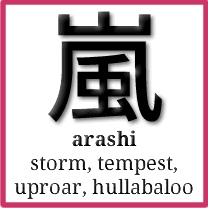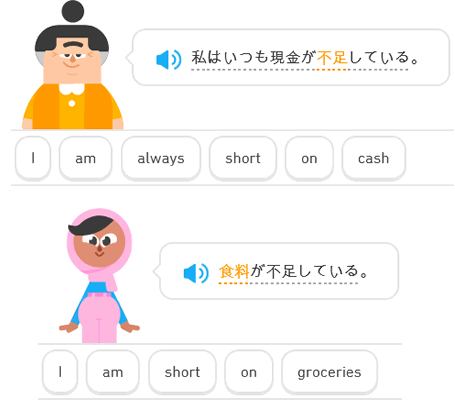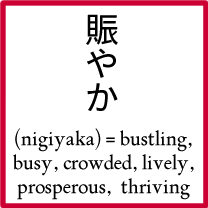
An interesting Japanese word I learnt recently is 嵐 (arashi), which means storm, tempest, uproar or hullabaloo [source].
It is made up of the kanji 山 (yama), which means mountain, hill, and various other things, and 風 (kaze), which means wind, breeze, manner, and various other things. So if when I first saw the kanji 嵐, I guessed that it was referred to some kind of wind from the mountains, or a wind that lives among the mountains.
嵐 appears in the following phrases:
- 大嵐 (ō arashi) = raging storm
- 砂塵嵐 (sajin arashi) = dust storm, sand storm
- 嵐の前の静けさ (arashi no mae no shizukesa) = calm before the storm
- 荒潮 (arashi o) = violent tide, fierce tidal current
- 嵐を呼ぶ (arashi o yobu) = to cause a commotion, to create a big stir, to invoke a storm
Other stormy words in Japanese include:
- 暴風 (bōfū) = storm, windstorm or gale, or literally “outburst (of) wind”.
- 暴風雨 (bōfū’u), = rainstorm or storm, or literally “outburst (of) wind (and) rain”.
- 吹雪 (fubuki) = snow torm or blizzard, or literally “blow snow”.
- 颶 (gu) = storm – normally appears in the word 颶風 (gufū) = tornado, hurricane, typhoon
- 猋 (hyū) = wind, storm, gale, dog moving (made up of three dog kanji – 犬 (inu))
暴風 and 暴風雨 can also be pronounced arashi [source].
The character 岚 [嵐] also exists in Chinese and is pronounced lán in Mandarin. It means mountain mist or haze, and is used mainly in place names, such as 岚山区 (Lanshan District), a part of Rizhao City (日照市) in Shandong Province in the northeast of China, and 岚皋县 (Langao County) in Shaanxi Province in central China.
There is also a district of Kyoto in Japan called 嵐山 (Arashiyama), and a nearby mountain with the same name. That area is famous for its bamboo forests.
A good spot for a bit of 森林浴 (senrinyoku), that is forest bathing / therapy, or in other words, a peaceful walk through the woods for health benefits. This word was apparently coined in 1982 by Tomohide Akiyama (秋山智英), the head of the Japanese Ministry of Agriculture, Forestry and Fisheries, to encourage more visitors to forests. Although it was a new word, the idea that spending time among trees in a forest is good for your health has been around for a long time in Japan [source]
While writing this, I realised that Omniglot doesn’t have a page about weather-related words in Japanese yet – I will put one together soon. If you know any interesting weather-related words and/or idioms in Japanese, do let me know.










